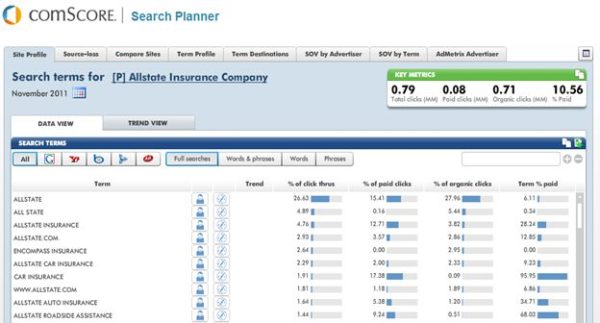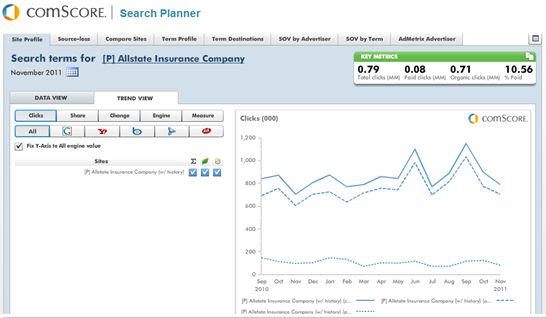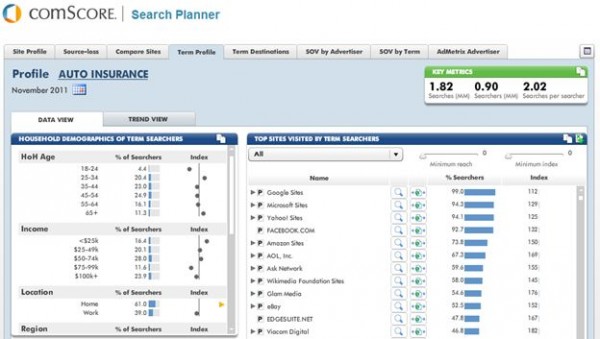comScore’s Search Planner: The Benefits Of Rich Panel Data
Five years ago, I shifted my career from a pure search agency to a full-service, digital media firm in order to expand my knowledge from just SEM to the other disciplines of this industry. I was pleased to discover that many of the ingrained, good habits I developed while honing my search marketing skills translated […]
Five years ago, I shifted my career from a pure search agency to a full-service, digital media firm in order to expand my knowledge from just SEM to the other disciplines of this industry. I was pleased to discover that many of the ingrained, good habits I developed while honing my search marketing skills translated very well to the execution and optimization of email marketing, display marketing, etc.
For example…granularity. For most paid search marketers, it’s all about granularity.
Evaluating performance solely at the campaign or ad group level is a big no-no in the paid search world. We get deep. Keyword level deep. Keyword-match type-bid-ad combo deep. Another niche skill was in developing insights from data and then constructing them into real English perceptions that marketers and non-marketers could comprehend.
Yes, a lot of what I learned in Search has helped me in the other arts of digital marketing. But the reverse holds true as well. There are things I’ve learned from other sub-niches of our space that have certainly made me a better search marketer.
One of the big things I learned from the non-search marketers was how to really get down and dirty in the research. Both online and off, researching demographics, competitive brand intelligence, and developing personas are huge parts of the building marketing strategies.
One of the research platforms my colleagues use most often is comScore. Their platform tracks many, many different things that digital marketers rely on daily to help put together media plans and help drive smart campaign budget allocation.
The primary source of comScore syndicated research and custom solutions comes from their panel comprising of millions of U.S. and global users who have given their permission to be tracked — kinda like the Nielsen set-top boxes that follow the real television habits of a slice of the population which project out to a very statistically significant measure of what America is watching.
Eli Goodman, Media Evangalist at comScore recently shared with me the vision on how their SEM tool, Search Planner, leverages this real-world data on behalf of search marketers.
“Our panel offers insight into the entire competitive search funnel in both a linear and a non-linear fashion. You can report on the search terms a searcher used, the impressions that were delivered on the SERP, and then close the loop by seeing the actual clickthroughs on those terms, both paid and organic. The simple way to think about it is we are able to offer you granular search-term specific data on not only your own website but also that of your competitors.”
Mr. Goodman knows that many search marketers are looking for answers to complex search question that his tool, Search Planner, can easily provide:
“Most search marketers have great insights regarding their own search campaigns, but they lack context as to what else is happening the marketplace. Without context, your 10% increase in paid click-throughs for the month may be masking the fact that you are lagging behind a 20% marketplace increase in paid clicks. Competitive intelligence is a key ingredient for judging success, because it allows you to benchmark your performance and – perhaps more importantly – help you identify the areas of opportunity in the search market and how you can better optimize your spend. Search Planner is a tool that provides these critical insights for search marketers and opens their eyes into what is really occurring in their competitive landscape.”
So, let’s take a look under the hood!
The tool, although highly complex underneath, has a very intuitive UI. For example, check out this search for Allstate Insurance Company. Very quickly, you can discover things such as what is working for the competition including their paid versus organic strategies, estimate competitive spend, etc.
Not only does Search Planner benefit from comScore’s panel and advanced research methodologies, but the in-house engineering/dev teams understand how marketers need to slice and dice the data in various ways. Using charts like the ones below, you can build quick insights from trends and graphing.
Learn the demographics and behaviors of your online searchers. You can see your share of voice across search engines and sites:
Because comScore measures all aspects of online advertising, you can connect your search efforts with the Display Advertising strategy. You can also see what sites your consumers are visiting after they search for your keywords online.
Mr. Goodman has a very focused vision on where Search Planner should live in the toolboxes of search marketers:
“Search Planner is really more of a strategic tool than a tactical tool. It is updated weekly and monthly, but is best used on an ongoing basis rather than day-to-day. Think Search Planner for big picture items like opportunity sizing and benchmarking share of clickthroughs, and then combining that data with the rich metrics you already receive from your web analytics and search engine packages.
Search Planner isn’t for everyone, as the main users of the tools are agencies and medium/large size marketers. This product offers premium information at a premium investment level, but those that do invest will have access to data that is almost impossible to find.”
Contributing authors are invited to create content for Search Engine Land and are chosen for their expertise and contribution to the search community. Our contributors work under the oversight of the editorial staff and contributions are checked for quality and relevance to our readers. The opinions they express are their own.
Related stories
New on Search Engine Land



